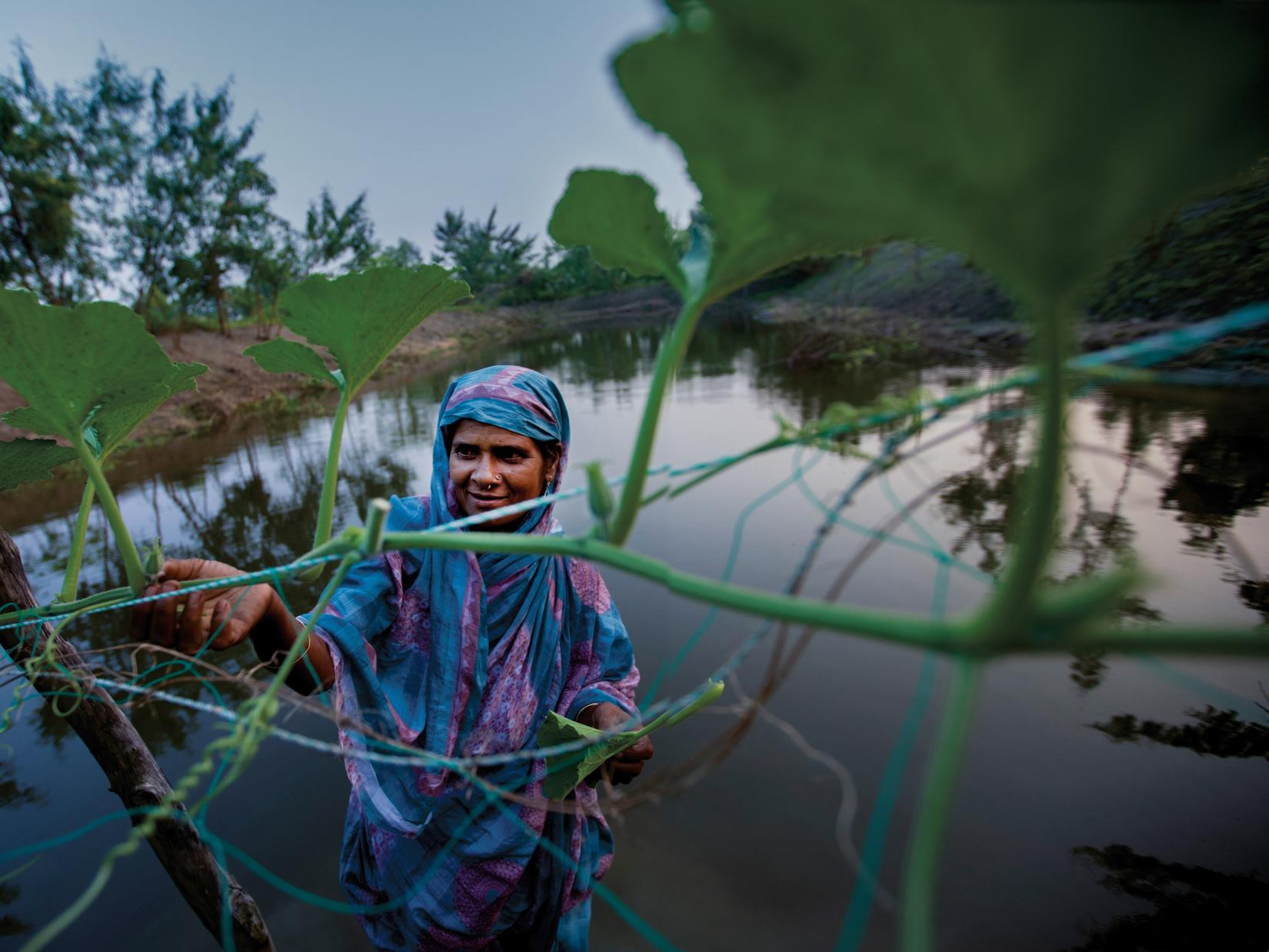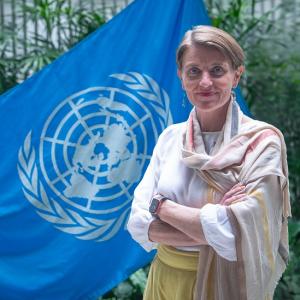Remarks by Ms. Gwyn Lewis, United Nations Resident Coordinator in Bangladesh for the Opening Ceremony of 2024 National Adaptation Plan Expo, Dhaka, Bangladesh
NAP Expo is an opportunity to discuss, together, the transition from National Adaptation Plan to action, including the all-important goal of raising financing.

H.E. Sheikh Hasina, Prime Minister of Bangladesh,
H.E. Saber Hossain, MP and Minster of Forestry, Enoviroment and Climate Change,
Ms. Farhina Ahmed, Secretary, Minster of Forestry, Enoviroment and Climate Change
Mr. Gabriel Kpaka, Chair, Least Developed Countries Expert Group (LEG)
Mr. Simon Stiell, Executive Secretary, UNFCCC
It is an honour for me to address the opening of the NAP Expo 2024 on behalf of the UN in Bangladesh.
It is timely and appropriate that Bangladesh is hosting the ninth NAP Expo 2024 in Dhaka.
As this audience knows well, Bangladesh remains one of the most disaster-prone and climate-vulnerable countries globally, ranking seventh in the Global Climate Risk Index for 2021.
In 2023 alone, Bangladesh experienced three cyclones – Mocha, Hamoon, and Midhili – that affected 1.5 million people, and devastating floods and landslides in the Chattogram region that affected over 1.3 million people.
Climate change is expected to increase the number and severity of such disasters and is a major threat to Bangladesh’s impressive development gains.
If global warming persists at its current rate it could force an estimated 17% of the population of Bangladesh to migrate internally by 2050.[1] An incredible number given Bangladesh’s population of over 160 million people.
According to the Intergovernmental Panel on Climate Change, the negative effects of climate change on crop production could adversely affect food security and lead to an increase in poverty of 15% by 2030.
Already, today Bangladesh loses 1.3% of its annual GDP due to storms, floods and natural disasters.
The Bangladesh Bureau of Statistics predicts that on current trends this will rise to two per cent of GDP by 2050 and nine per cent by 2100.
We have also seen climates very real impact on people’s health:
2023 saw the largest outbreak of dengue fever in Bangladesh’s history, with mosquito-borne diseases likely to become more prevalent with increasing extreme weather events.
Knowing the huge risks to this progress, Bangladesh has been proactive in planning for climate change adaptation.
One country cannot address climate change alone however, and without concerted action now, the path to sustainable development is uncertain.
This is why the Secretary General of the United Nations has declared tackling climate change as one of the six key accelerators for the fulfilment of the 2030 Agenda. And why the UN in Bangladesh has as a highest priority to support the government to foster a ‘Sustainable, Healthy and Resilient Environment’
As a party to the UN Framework Convention on Climate Change, Bangladesh must be congratulated as one of 53 countries that has developed a National Adaptation Plan for 2023–2050 that “envisions building a climate-resilient nation through effective adaptation strategies that foster a robust society and ecosystems and stimulate sustainable economic growth.”[2]
This NAP Expo is an opportunity to discuss, together, the transition from National Adaptation Plan to action, including the all-important goal of raising financing.
It is also why the Prime Minister’s initiative of establishing a Bangladesh Climate Development Program is so important. As it will ensure coordination of critical resources behind the government’s plans and significant investments on adaptation.
According to the national SDG Costing Exercise conducted in 2022 and supported by the UN, the estimated synchronised[3] cost for achieving SDG13 in Bangladesh is $11.58 billion per year on average.
On climate change adaptation specifically, I know that the Government of Bangladesh estimates that approximately $230 billion will be required by 2050, the equivalent of $9 billion per year on average,
In addition to coordinated planning for climate adaptation, Bangladesh is now making its mark as a leader in climate financing, recognizing the need to mobilize international and domestic climate financing, including from the private sector, to supplement the considerable investments from the Government, totalling $3.4 billion alone in this year’s national budget
In 2023 alone, the UN’s International Fund for Agricultural Development delivered more than half a billion dollars in investments in sustainable and resilient agriculture and climate adaptation.
In addition to the investment in climate adaptation, we are working to integrate a climate lens on UN programmes on health, food security, gender, youth, governance and migration.
For example, the UN is also accompanying Bangladesh’s global leadership on the UN Food Systems Summit, leading the coalition on Climate Resilience.
The UN’s normative and policy interventions include work to support climate change adaptation for gender equality and women’s empowerment and leaving no one behind.
The UN is supporting the Local Government Initiatives on Climate Change (LoGIC) programme. Since LoGIC began in 2016, 1.97 million of the most climate vulnerable people, including 56 per cent women, from nine Districts have directly benefited from grants and capacity-building support. At COP28,
LoGIC received the Local Adaptation Champion Award in the category of 'Innovation in Developing Climate Finance'.
In addition to supporting adaptation and mitigation we continue to work closely with the government to bolster nationwide disaster preparedness and risk management.
In a major milestone in 2023, Bangladesh adopted the Secretary General’s initiative for ‘Early Warning For All’ approach and formulated a national roadmap for 2023-2027.
Bangladesh was the world’s first country to create a multi-hazard Anticipatory Action framework covering both floods and cyclones.
Before Cyclone Mocha and flash floods last year, 45,000 people received timely cash payments.
Multistakeholder partnerships, particularly with the private sector and international financial institutions, are also key to driving success on climate action and adaptation, and to support the Government of Bangladesh’s efforts to identify pipelines of bankable projects.
Through these initiatives and many more, the UN in Bangladesh pledges its full support to continue these efforts to support Bangladesh’s adaptation to climate change, and to stay the course of its development journey.
Excellencies,
With the Summit of the Future on the horizon in September 2024, this is an important occasion to bring world-leading experts on climate and environment together. I know Bangladesh will have a strong voice at those discussions, but we all need to work together to make national adaptation a reality for people across the country.
On behalf of the United Nations in Bangladesh, I congratulate the Government for this event, and for convening us around a common cause here in Dhaka for the NAP Expo.
We look forward to continuing to support the Government in its efforts to implement the NAP here in Bangladesh, to mitigate and adapt to climate change, and to raise the financing for a steady course towards Agenda 2030.
Thank you.
[1] Fahmida Khatun and Syed Yusuf Saadat, ‘Climate Change in Bangladesh: A Sustainable Development Perspective’ (paper for LDC5 2023).
[2] NAP page iii National Adaptation Plan of Bangladesh (2023‐2050) | United Nations Development Programme (undp.org)
[3] The synchronized cost in the costing exercise factored in the impact of action on other SDGs to avoid double counting.
Speech by











